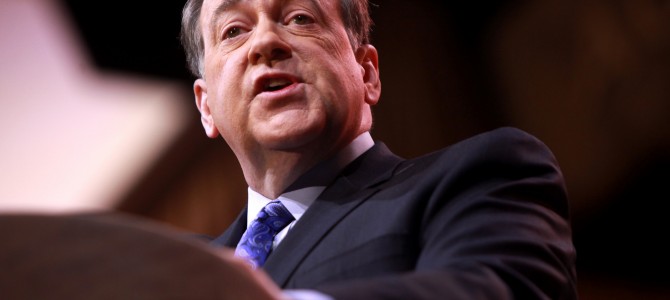
Sometimes, probably because he’s such an affable media presence, I forget why I dislike the political version of Mike Huckabee so much.
Maybe it’s the awe-shucks populism that isn’t substantively very different from the class-conflict rhetoric we hear from so many on the Left these days. Or maybe it’s that everyman Huckabee has been running for one political office or another for the past 25 years – a fact that might escape the attention of anyone listening to the nuggets of blue-collar wisdom found in his speeches and those God, guns, grits, and gravy books he writes.
Since his last run for the presidency, Huckabee has hosted a national radio show and television show, and he’s endorsed all sorts of interesting products, including “secret biblical cures for cancer” to, no doubt, some unfortunate and desperate people. Because, Huckabee, like all of those selfish plutocrats he likes to denounce, is out to make a buck.
Or maybe it’s his paternalistic attacks on pop culture, the ones that make him sound like some reincarnated member of the PMRC, that are so off-putting? After all, as governor of Arkansas Huckabee was a zealous Nanny State advocate– passing precedent-setting intrusions into the lifestyles choices of individuals in Arkansas.
It could also be his role as John McCain’s hitman in the 2008 primaries, when he attacked Mitt Romney’s faith in an effort to dissuade Evangelicals from supporting the Mormon candidate. Focusing on a candidate’s belief system, at least from my perspective, is within the bounds of acceptable political debate. But Huckabee’s churlish innuendo dropping should have undercut any perception you might have that the cheery former Baptist preacher is anything but your typical politician.
Mostly, though, it’s his philosophical outlook.
Yes, he’s the anti-libertarian candidate. And I mean “libertarian” in the smallest of small “l” sense. There are a number of policy fights on the center-right of American politics, but there’s also a measure of ideological unanimity (even if it is often only theoretical) about the role government– namely, that it should, to some extent, be smaller and less intrusive. There is no conceivable way for Huckabee to make that argument or represent that consensus.
Kasie Hunt of NBC News asked if Huckabee might be seen as the GOP’s Bernie Sanders. Quite the opposite, actually. Sanders advocates a set of purified beliefs that drive contemporary Democratic Party grassroots politics. As a political tool, Sanders can be useful in making Hillary look reasonable (and perhaps even fresher). Huckabee, on the other hand, is what liberals in the media imagine a strong Republican candidate might look like. I mean, what segment of the GOP will Huckabee represent? The social conservative vote is well covered this time around. So is it the tax-hike faction? The anti-trade faction? The we-need-more-laws faction? The anti-school choice faction that believes teachers’ unions are doing a great job and No Child Left Behind is “the greatest education reform effort by the federal government” in our lifetime?
Yet, even as Huckabee announced his run and evidence began to emerge on social media that he was going to have a tough gaining traction with any conservative group, he was getting plenty of accolades from the press. Chris Cillizza found Huckabee’s vacuous presidential announcement solid. He wrote about it in a piece titled: “Why the Republican Party really needs Mike Huckabee right now.”
Because even though Huckabee remains outside of the top tier of candidates, he is, by far, the Republicans’ best messenger to the middle and lower-middle classes — economic brackets that the party has struggled to win in recent elections.
If we concede Cillizza’s contention is true – and there is no evidence that it is; in fact, it’s arguable that Republicans are struggling with middle-class voters any more than Democrats – his piece, and many like it, make the enormous assumption that the GOP can only appeal to these brackets by using the language of the Left.
And if you believe that, then yes, Huckabee is your man. Take this statement regarding entitlements as an example:
There are some who propose that to save the safety nets, like Medicare and Social Security, we ought to chop off the payments for the people who had faithfully had their paychecks and pockets picked for the politicians, promising them, that their money would be waiting for them when they were old and sick.
A Huckabee presidency, it seems, would feature the “there are some people who propose …” strawman that you’re no doubt familiar with after listening to our president’s fine speeches. But who exactly is proposing we chop off payments to people who have faithfully paid into the system for years? There is no mainstream conservative in this country who advocates for Washington to eliminate benefits already promised to citizens. This is the same dishonest argument you hear whenever there’s talk of entitlement reform. Almost every plan offers an element of choice, allowing people to voluntarily enter into a new deal with government, or it changes the parameters of entitlements for future generations.
Now, I confess, that if Huckabee was serious about being president rather than simply running a vanity campaign, this sort of thing would matter far more. But the media will almost certainly use Huckabee as an example of how conservatives should be talking about poverty, inequality and entitlements, because his rhetoric will often be indistinguishable from what we hear on the Left. But America already has a party tasked with making that case, do we really need two?









